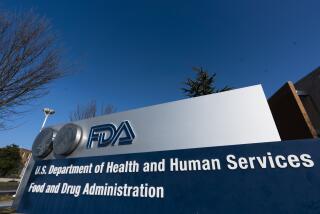Cutting Adverse Drug Reactions
- Share via
Last week’s headlines--”Medications Kill 100,000 Annually, Study Says”--were enough to make anyone think twice--and worry.
After pooling and evaluating data from 39 U.S. studies on adverse drug reactions among hospitalized patients published from 1964 to 1996, University of Toronto researchers estimated that properly prescribed medicines killed more than 100,000 people in 1994, picked as a representative year, and that 2.2 million more had nonfatal but serious reactions to drugs that year.
Critics of the study are concerned that the method--a technique called meta-analysis, in which the results of several small studies are pooled and evaluated rather than studying subjects directly--has limitations.
“Combining the results of small, heterogeneous studies does not necessarily bring one closer to the truth,” wrote Dr. David W. Bates, a Harvard Medical School associate professor of medicine who has also researched adverse drug reactions and who wrote an editorial accompanying the study, published in the April 15 Journal of the American Medical Assn.
Nonetheless, Bates believes adverse drug reactions are on the rise and that consumers and the medical community can reduce the risks.
“Although some risks are inevitable, they can be significantly reduced,” Bates wrote.
In a telephone interview on Friday, Bates elaborated on the problem and how to minimize it.
*
Question: Who is most at risk for adverse drug reactions?
Answer: The people at highest risk for adverse drug reactions are patients who are taking a lot of medications and who are the sickest. The elderly are more at risk because they have less reserve. Children are also more at risk, particularly young children below the age of 2 years, because their organ systems haven’t matured. It’s also hard for them to express how they are feeling.
*
Q: So what can patients do to reduce risk and to minimize their fears?
A: I think that any time patients start a medication, they should think about the risk of the drug as well as the benefit and that they should discuss the risks and benefits with their physician. We now have more information than we ever did about the benefits of drugs and we know that there are many situations where drugs are of great benefit.
*
Q: But it’s more difficult to talk things over at leisure if you’re hospitalized. What do you do then?
A: It’s harder for patients when they are hospitalized because often they are not alert or they are in pain. Nonetheless, it’s reasonable to talk with your physician or nurse before you put anything in your body, particularly before you start a new medication.
*
Q: Any suggestions on how to insist on that so the nurse or doctor doesn’t stomp off in a huff?
A: Although doctors and nurses do sometimes take offense, I think that’s inappropriate on their part. And I think it’s reasonable to ask: What is this pill for? What is it going to do for me? And if I have side effects, what might those be? And how soon would they occur?
*
Q: So you’re saying, forget about asking about the name of the drug if you’re asking from a hospital bed?
A: Yes. But for outpatient drugs, I think everyone should try and learn the names of their medications, what they do and how often they should take them.
*
Q: Is there any information a hospitalized patient--especially one with a chronic medical condition--should be sure the doctor or nurses know?
A: Yes. Any time a patient goes to the hospital, it is useful to bring a list of their medications and the doses they take or a bag actually containing the pills.
*
Q: What safety practices should a patient expect on the part of the hospital to minimize adverse drug reactions?
A: I think the patients should expect that the hospital will do a careful check on what medications patients take on a regular basis. And then, after the patient is in the hospital, the hospital should have strategies for checking what medications the patient is allergic to and making sure the patient doesn’t get any of those medications, for looking for drug-drug interactions for medications that shouldn’t be given together and for making sure that the dose of medication the patient gets is appropriate for their age and kidney function.
*
Q: Is it possible to say which drugs are particularly risky as far as adverse drug reactions?
A: The drugs that cause serious reactions tend to differ from the ones that cause more minor reactions. Antibiotics are the commonest cause of minor reactions. Among the fatal reactions, the types of drugs that most often cause those are chemotherapeutic drugs, anticoagulants and cardiovascular drugs.
*
Q: What symptoms might suggest an adverse drug reaction and the need for medical help?
A: The symptoms are specific for the drug. But any time a patient develops a rash, hives or has trouble breathing, he or she should let their doctor know immediately and stop taking the medication.






